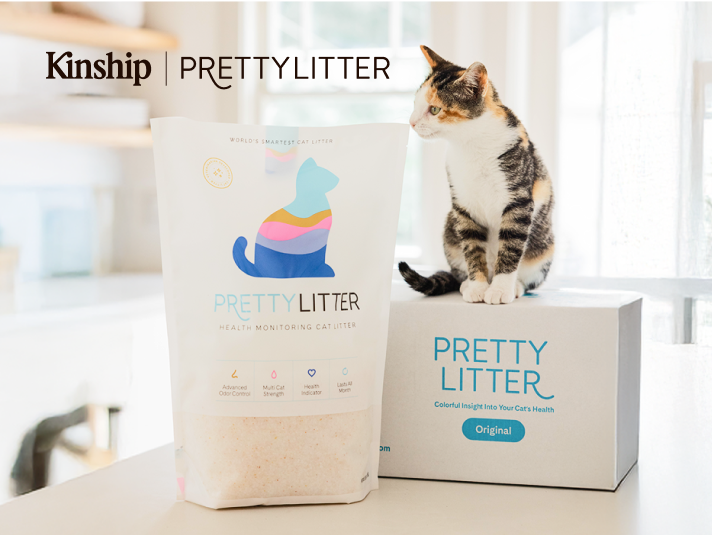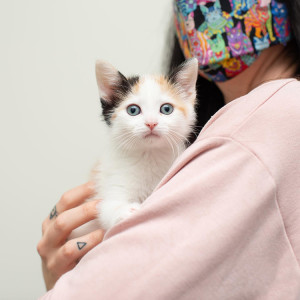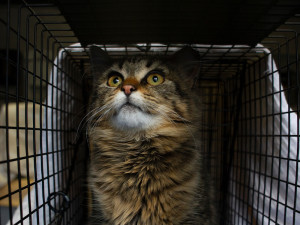Sterling “TrapKing” Davis is Going Global
The rapper-turned-trapper quit his music career to start a cat rescue, has saved the lives of thousands of strays, and is promoting diversity in the animal welfare world. This spring, he’s taking things international.
To the Rescue is a column about visionary animal advocates.
“It’s like Christmas — people’s faces light up when you give them this gift,” says Sterling “TrapKing” Davisopens in new tab. His joy is palpable, even over the phone, as he casually chats with me on his drive from Atlanta, GA to Asheville, NC in his emblazoned RV. “I tell them I’m gonna come out. I’m gonna trap the cats. I’m gonna get them spayed, neutered, and vaccinated. I’m gonna give you the paperwork. And then I’m gonna take them back. And they’re like, ‘You’re gonna do all that? How much do I owe you?’ And I’m like, ‘I don’t charge anything.’ I love the look on their face when I say that.”
Save on the litter with color-changing tech that helps you better care for your cat.
If you — like us — spend a bit too much time watching pet videos on Tiktok and Instagram, there’s a good chance you’ve seen some “TrapKing” content before, possibly thanks to the episode of the Netflix show Cat Peopleopens in new tab that is devoted to him. His story of serving in the military, starting a burgeoning rap career, and going on to become a nomadic cat rescuer is memorable — but even more so is the infectious enthusiasm he brings to his TNRopens in new tab (trap, neuter, release) work.
Davis calls Atlanta home, but he has been hunkering down in Asheville for most of the pandemic. When we spoke, he was calling from the road: One of his cats, Damita Joopens in new tab, was off her food, so he was taking her up to his vet to get her checked out. (Luckily, his other cat, Alanis Mewisette, was doing fine).
How much do you spend on your pet per year?
Back in 2015, the former Navy operations specialist was on a break from a rap tour when he applied for a job scooping kitty litter at the county shelter. It didn’t take long for the lifelong cat lover — and cat dad to Rick James at the time — to realize that rescue was his calling. He was soon promoted to an outreach position and focused his efforts on TNR, the only way to humanely control cat overpopulation. (It’s simply not possible to rescue all the cats, plus not all “feral” cats do well in a home. With TNR, community cats are trapped, spayed/neutered, vaccinated, then returned to their wild homes.)
Two years later, Davis launched his own mobile nonprofit, Trapking Humane Cat Solutionsopens in new tab, and has since traveled around the country TNR-ing stray cats, rescuing and rehoming adoptable ones, educating people on how to care for community cats, and promoting diversity in the animal welfare world. His motto? You don’t lose cool points for compassion.
Davis is the first to admit that he’s not what comes to mind when most people picture an animal rescuer. “I’m a bald, tattooed Black dude. It’s two in the morning. I’m near your yard saying, I’m just here for the cats!” he told Atlanta Magazine last year. But that’s part of the problem — that people have a specific view of what animal welfare looks like, and that people don’t feel comfortable approaching communities outside of their own to try and help animals. Davis is bridging the communication gap between Black communities and predominantly white animal welfare organizations.
“Like most things, a lot of it is misunderstanding and communication,” he explains. It’s about combating misinformation, about talking to people, and about improving understanding — often in underserved communities. But in most of these places, it isn’t just about community outreach, where there’s an outside organization coming in to try and put a band-aid on the problem. Something he’s been working on with the people at CAREopens in new tab — a BIPOC-led nonprofit dedicated to equity in animal welfare — is what he calls “inreach,” which involves finding the people inside a community who want to help, making sure they have the resources to do so, and the ability to communicate with the people around them.
“What I do is go to an apartment complex and have a contest with some of the teenagers that live there,” he explains. “I say, ‘If you watch my traps, the first person who texts me gets $30. The second person gets $25, the third person gets $20, and so on.’ When I come back, they’re gonna be like, ‘Hey, you gonna do that thing with the cats?’ And if I say, ‘Yeah but I can’t pay y’all this time, somebody’s gonna say they just wanna do it anyway. And that’s your person — that’s the outreach person who can communicate with that community.”
Davis has already racked up serious miles via his TNR work, and that number is about to climb dramatically. This May, he’s taking TrapKing international for the first time, for a national awareness campaign in Greeceopens in new tab in collaboration with global animal welfare organization SMARTopens in new tab (Successfully Managing Animal Rights Today). He explained that there is a stray cat epidemic in Greece, and while rescuers there love and want to be able to manage the cats more effectively, they’re struggling with a shortage of resources on the ground. So, Davis and seven vets and vet techs are teaming up for a TNR marathon tour around the country.
With any luck, a successful trip to Greece will raise awareness around the world about community cat care. With an estimated 70 million stray cats in the US alone, and kitten seasonopens in new tab fast approaching, there is a need for TNR more than ever. If you want to help, search for local TNR groups around you (most cities have at least one), donate directly to TrapKing Humaneopens in new tab, or sponsor Davisopens in new tab’ TNR mission in Greece.opens in new tab





